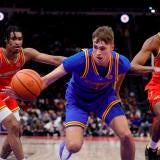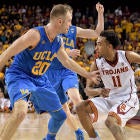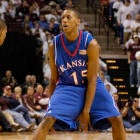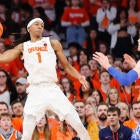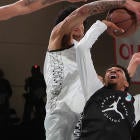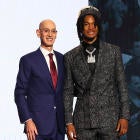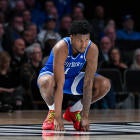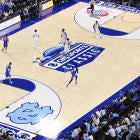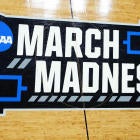If you watched USC's 84-76 victory over UCLA late Wednesday you probably noticed the Trojans scored 50 points in the first half and made 14 3-pointers in the game, at which point you likely concluded Steve Alford's team took a second loss in a five-day span because their defense failed them again.
That's both right and wrong.
Yes, UCLA's defense allowed too many open jumpers and so many dunks I lost track somewhere along the way. But here's the truth: That's basically what UCLA's defense does -- proof being how the Bruins' adjusted defensive efficiency rating actually improved after the loss to USC. In other words, UCLA's defense played like UCLA's defense and not unlike it performed even when the Bruins started this season 13-0 with convincing wins over Kentucky, Michigan and Ohio State.
So the defense wasn't the problem at USC.
Or, at least, it wasn't a new or surprising problem.
The main problem at USC was that the Bruins' historically great and usually reliable offense failed them. They committed 17 turnovers and missed 14 of 20 3-pointers. And if you didn't know before, you should know now: UCLA's defense makes it hard for the Bruins to beat quality opponents unless they're awesome, or at least really good, offensively. And, ultimately, that's what seems likely to keep them from winning their 12th national title or even making the Final Four for the first time since 2008.
The numbers are not on UCLA's side.
Neither is history.
That's the long and short of it.
The Bruins' adjusted defensive efficiency rating through 22 games is now 102.3. Granted, unless you dig analytics, you might not know what that means. But you don't need to know what that means as long as you know this: No school in the KenPom era, which dates to the 2001-2002 season, has won a national title after entering the NCAA Tournament with an adjusted defensive efficiency rating above 93.3, and no school in that same time frame has reached the Final Four after entering the NCAA Tournament with an adjusted defensive efficiency rating above 98.3.
Again, UCLA's adjusted defensive efficiency rating is 102.3
So that's the bad news.
The good news? UCLA's adjusted offensive efficiency rating is 124.4, which would be the third-best number any team from the KenPom era has ever carried into the NCAA Tournament if the NCAA Tournament happened to start today.
(FYI: UCLA's adjusted offensive efficiency rating was 125.6 before the US loss, which had the Bruins on pace to post the best such pre-tournament number ever. But Wednesday's performance came with a statistical cost. So it's third-best now.)

Obviously, teams with great offenses are best equipped to overcome the problems a poor defense creates. You don't have to be Dr. James Naismith to understand that, and it is that which provides UCLA hope that otherwise wouldn't exist. But it is worth noting that the best pre-tournament offense in the KenPom era belongs to the 2013-14 Creighton team that was led by Wooden Award winner Doug McDermott and posted an adjusted efficiency rating of 125.5, and those Bluejays were upset in the Round of 32 by Baylor for the same reason UCLA was upset Wednesday at USC, i.e., because their defense -- with an adjusted efficiency rating above 100 -- was so bad they had to be otherworldly offensively to win big games.
When they weren't, they didn't.
Just like when UCLA isn't, it doesn't.
Bottom line, UCLA has real issues that must be resolved or else. The Bruins have a once-in-a-decade point guard (Lonzo Ball), at least two other future NBA players (TJ Leaf, Ike Anigbogu) and enough talented veterans (Bryce Alford, Isaac Hamilton, Aaron Holiday, Thomas Welsh) to be reasonably placed on the short list of teams with rosters good enough to cut nets in April. But they need to improve defensively because the odds of them trading baskets before eventually outscoring six straight opponents without a single blip in a single-elimination tournament aren't great.
Can they do it?
Maybe, I suppose.
Crazy things do sometimes happen.
But no team in the past 15 years (and perhaps ever) has done it or even made the Final Four with an adjusted defensive efficiency rating like the one UCLA is carrying into Wednesday's game at Washington State. Like I wrote, perhaps the Bruins can become the first. But if I'm Steve Alford, I'd have no interest in trying because trying to become the first to do anything typically ends in disappointment. Unprecedented things are, after all, usually unprecedented for a reason, you know?








